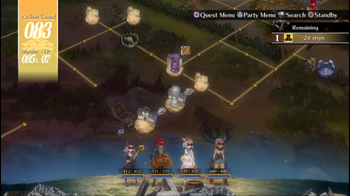
Grand Kingdom Review
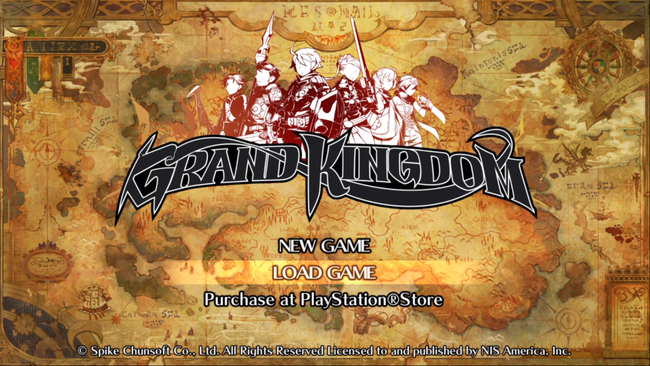
Grand Kingdom is a bit of an odd game. While it technically stands as the spiritual successor to Grand Knights History, a PlayStation Portable RPG that ultimately never saw an overseas release, players do not need to play it to understand Grand Kingdom. Both directed by Tomohiko Deguchi, Grand Kingdom shares a similar framework to Grand Knights History, but it is important to note that this was developed by Deguchi’s newfound studio, Monochrome Corporation, instead of Vanillaware this time around.
At its core, Grand Kingdom revolves around constructing a mercenary group to tackle various quests. There are numerous systems that surround the simplicity of its foundation – some well thought-out and some poorly conceived.
First and foremost, the most outstanding part of this game spawns from the act of executing missions in quests. Presented like a board game, parties travel the landscape in the form of a chess piece through straight paths. Each “move” consumes a turn that allows time to continue forward and thus, allow all the pieces on the battlefield to progress as well.
Players are tasked with leading their band of mercenaries toward different objectives from acquiring resources to eliminating key enemy groups, gathering hidden treasure, and much more. Traversing the field is not as easy as it seems when Mother Nature comes knocking. Wild weather conditions, like quicksand and thunderstorms, often stand in the way of players, in which they must decide to wait it out for a few turns, force their way through it at the cost of some HP from all their party members, remove it with a Disaster Talisman item, or simply back out and find an alternate route.
Turn count is a key factor in Grand Kingdom; game over occurs if that counter decreases to 0 in most cases. Luckily, quests give you an ample amount to diverge from the main path to explore around for items and materials. To those who are willing to be a bit more tactical, adjusting the difficulty for a quest entails decreasing the overall turn count in exchange for higher rates on EXP, Gold, and Royals. This enriching trade-off mechanism helped make my experience with quests feel more rewarding and push me to consider all the factors on a given map.
Party groups only consist of hired mercenaries which can be acquired in the Barracks for a small fee. Only a set amount of them will be available at a given time though, so trying to find a desired class can be a test of needless patience. I wish that at least one of each class was always available in that hiring pool, instead of forcing players to wait until it shows up for them. There is a decent amount of options to customize each unit from their name, clothing color, and voice. I had a blast creating goofy color-themed parties filled with ridiculous character names.
When a player’s piece lands on the same spot with an enemy, a combat scenario ensues. This is where Grand Kingdom really shines.
A player’s mercenaries face off against foes on a horizontal plane split into three lanes. They can freely move left to right and switch to other lanes as long as a character’s move gauge allows them. Accidental steps can be undone as long as that character did not take damage already by a hidden trap or other miscellaneous item.
Each of the 17 classes of units in Grand Kingdom is unique from one another, but their method of attack is primarily split on their distance from the enemy. Classes like Fighters, Rogues, Blacksmiths, and Dark Knights must close in to attack with their melee weapons while Arcanists, Archers, Witches, and Hunters can attack comfortably from the rear to inflict damage from a distance. Performing attacks from these ranges vastly differ since players must manually carry out every single attack on a target.
Melee interactions consist of a combo chain from a customizable move-list. A button corresponding to an attack will pop up on screen once the engagement starts; it will flash with a white light for a split second shortly after an attack is executed for a chance at a Just Cancel. Correctly pulling off a Just Cancel will immediately start the animation of the next attack and grant bonus damage.
On the other hand, ranged attackers must time their shots to hit targets effectively. When a player begins their assault, a designated area on a lane must be assigned which “mark” where the projectiles can go. From there, a reticule will travel along the ground within that region; successful shots depend on a player's ability to time attacks when that reticule and enemy line up together.
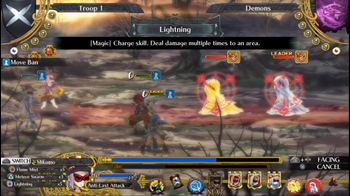
Beware that some attacks from specific classes move the enemy in a specific direction upon impact. A Witch’s Fire Spell, for example, launch units back if they are hit from the front, so there is a risk that they could be knocked out of the target zone due to the spell. Certain types of units are weak to others with melee classes taking additional damage from magic users who get mauled by ranged attackers.
Friendly fire is also a big another factor to consider, since all attacks in Grand Kingdom can damage friendly units! Imagine my surprise when I first found that out with my Medic hurled an Acid Bag at my Fighter's back. From there on, I quite enjoyed constructing multiple parties that possessed an effective chemistry in damaging enemies, sustaining their HP, and attacking from ranges that would not inconvenience their comrades in the following turns.
Note that all these attacks consume a separate action gauge per attack, but saving the leftovers of the move gauge will actually stack onto it allowing more attacks for greater damage potential. Therefore, managing how much a unit moves is vital to maximizing damage output.
Another key resource in combat is the Assist Gauge, which encompass the top corners for both allies and opponents. Represented by blue orbs that fill up when harming opponents, this gauge allow for other systems to come into play – the option to finish a foe near death with an assist attack, activating the last-stand Grit mechanic on a unit about to be killed, and how much health units will recover at the end of the battle.
More Assist Gauge orbs equate to recovering more HP when combat is finished, while the former two systems consume orbs; there is a bit of a tug-of-war that a player must weigh in on how much they are willing to solidify their offensive assault and fortify their defensive capabilities at the expense of recovering their troops.
There are a ton of deeper mechanisms to explore and dabble with in Grand Kingdom. Players are free to mix and match their numerous mercenary groups as they see fit, though they can only use one group at a time to carry out a quest. Parties will often consist of four members, though the special Dragon Mage class is so big that it will actually consume two slots in a given party.
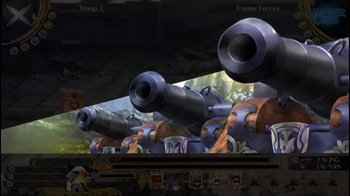
Each class learns several abilities as they level up, which further evolve the potential of how a party can approach battles. Every level up also grant stat points to strengthen a character’s offensive and defensive capabilities. Additionally, reaching level 20 on a unit opens up the ability to give a substantial boost to a stat by increasing its grade.
Parties are fully customizable down to a character’s weapons, armor, move-set, abilities, spells, accessories, and so forth. Each piece of equipment come with a certain number of slots to place gems into; these gems provide additional buffs to attack types, physical defense, and magical resistance, along with many others. Players can even select between two types of control schemes (Simple or Technical) per character that give even greater control on how they want to operate a unit in battle.
Though there seems to be an overwhelming amount of elements in the combat alone, I had a thrill in exploring what kinds of parties worked for me. Grand Kingdom openly encourages players to fiddle with a composition of classes that work best for them. It is a bit of a shame that its tutorials only cover the bare basics, though discovering the finer points were a reward in themselves.
Experimentation is essential in keeping the experience fresh though. I quickly discovered that I grew weary of parties if I stayed on them for too long. Therefore, I structured multiple parties to commence unconventional battle tactics to keep encounters entertaining; how much Grand Kingdom’s battle system will keep players interested largely depends on their willingness to simply trying other party configurations.
From there, multiple modes in Grand Kingdom revolve around that elaborate framework. A single player campaign chronicles the tale of the player’s mercenary group working for the Guild and their struggle against a cult group attempting to resurrect the Uld Empire through shady methods. This only lasts a handful of missions and I did not particularly find it engaging.
With only a handful of shallow characters and no narrative hook to grab me, Grand Kingdom’s campaign proved to be a slog to play through. Objectives consist of traveling toward a designated point, viewing a story sequence, and maybe a fighting a boss at the end. I do admit that the four medic characters were amusing distractions.
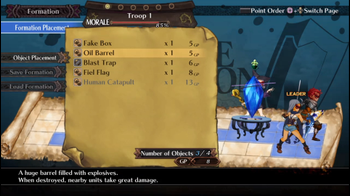
What particularly frustrates me about the story is that its scope is ridiculously tiny making little use of its interesting world design. Grand Kingdom takes place in a land divided between the Four Great Nations: Landerth, Valkyr, Fiel, and Magion. Each of these nations support certain philosophies, whether it be for tranquility, valor, or otherwise. A player can visit the capitals of their nations to check what their citizens have to say, upgrade their equipment, purchase special wares with the Royals currency, and meet their rulers if they are in a contract with them. None of these nations play a factor in the campaign at all, so players are stuck with a rather uninteresting group of characters for the duration of it.
These Four Great Nations only really come into the picture when a player participates in the online-only War mode. In these asynchronous online multiplayer operations, players must first enter into a contract with one of the nations to fight for them. Then the game provides a striking amount of strategic information outlining the territories being contested, which nations have entered into a treaty, and the overall progress of how the current war is turning out.
The presentation in War mode is awesome; I felt like I had a significant stake because I was given a detailed insight on the bigger picture. Players can deploy their other parties to fight in the war and they will gain passive EXP upon their return, even if they lost all their battles (the AI in Grand Kingdom is not particularly intelligent in handling them). Plunging into a battlefield inside this War mode has players simply trying to take over more settlements than the other side. Players can hire two more additional units into their party for a small fee for extra support.
That is basically the gist of War mode in Grand Kingdom; it helps extend the longevity of the game, but it did not leave a strong impression on me in the few Wars I took part in. Players who cannot access the online mode in the game still have a plethora of quests to do, but they cannot level their other parties passively unfortunately. There are also ways to assist in the war effort by investing their resources in a nation’s capital to aid them through indirect means by purchasing war armaments, setting special rules, and even developing higher-end weapons for their troops.
Content duration in Grand Kingdom is not lacking at all. While the campaign alone only lasts a bit over 15 hours, the amount of different quests is staggering and the War mode can easily keep interested players busy for many hours to come. Building up powerful squads takes a lot of time and it solely depends on how much a player loves the core gameplay systems.
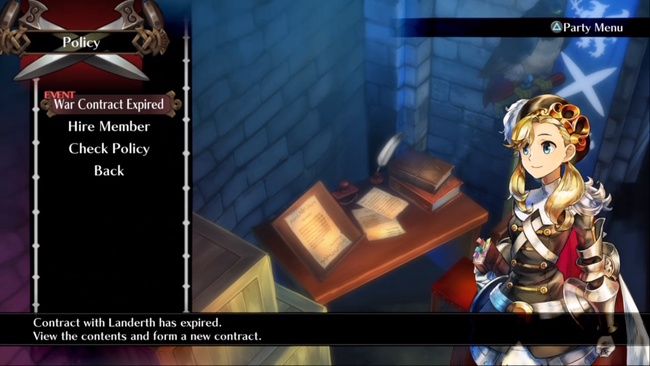
I found Grand Kingdom an absolute treat to look at; its artistic style does resemble Vanillaware's unique flare, but it utilizes it in creative ways. The character designs are excellently crafted – both the full-body portraits in scenes and the game models themselves. Animations are fairly decent, though some classes could use a few more frames to smoothen out some of their combat stances for several actions.
Attacks themselves are rich with beautiful graphical effects married with powerful sound effects to provide satisfying impacts on each hit. I especially loved chaining melee attacks with the dual swords on Dark Knights due the ferocity of their attack patterns. Every time the last foe is killed, a dramatic slowdown showcases the end of the battle that adds a last satisfying punch; I thought I would grow tired of it, but it still continues to amuse me.
Just like in Grand Knights History, the team from Basiscape returns to Grand Kingdom with wonderful tunes to reinforce the overarching theme of war. The theme for the Barracks left a great impression on me though, due to its calm, easygoing nature of taking a breather before marching forth once again to the front lines. I do feel that the track selection seems limited, but what is there is most definitely effective.
Environmental variety is lacking from the board-game perspective of the overall map; there are different regions that will unlock once a party reaches certain levels, but the particular backdrops did not really stick out. Combat backgrounds seem limited too, but the amount of detail in them was a welcomed feature to my eyes.
I feel mixed on Grand Kingdom because I want to like it, but it just seems lackluster on its feedback loop of repetitive mission design; there is nothing that significantly caught my attention outside of the intricacies of battle from constantly building parties of different classes. Its story is severely lacking, and the War mode has a few neat quirks that overstayed its welcome rapidly. Grand Kingdom is an entertaining experience that presents neat, unconventional approaches to the genre, but there are so many aspects of its infrastructure that just seem haphazardly unrealized.
